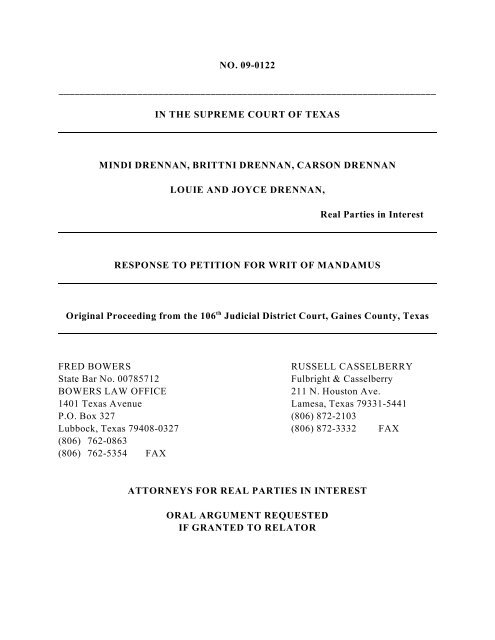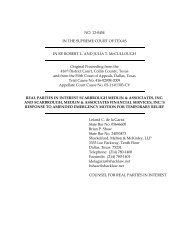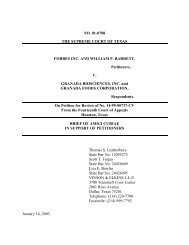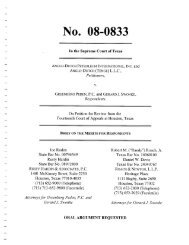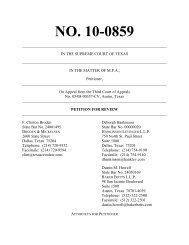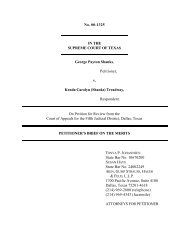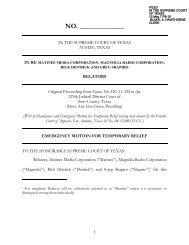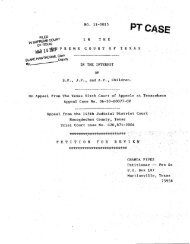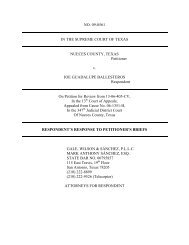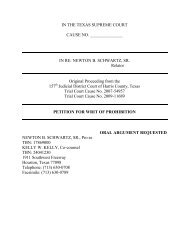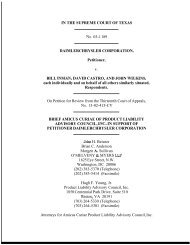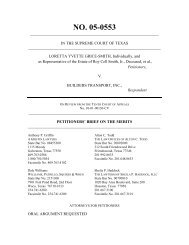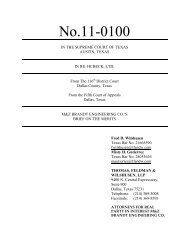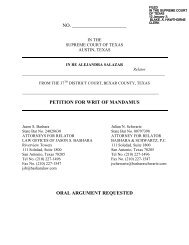Response to Petition for Writ of Mandamus - Filed - Supreme Court ...
Response to Petition for Writ of Mandamus - Filed - Supreme Court ...
Response to Petition for Writ of Mandamus - Filed - Supreme Court ...
Create successful ePaper yourself
Turn your PDF publications into a flip-book with our unique Google optimized e-Paper software.
NO. 09-0122<br />
________________________________________________________________________<br />
IN THE SUPREME COURT OF TEXAS<br />
MINDI DRENNAN, BRITTNI DRENNAN, CARSON DRENNAN<br />
LOUIE AND JOYCE DRENNAN,<br />
Real Parties in Interest<br />
RESPONSE TO PETITION FOR WRIT OF MANDAMUS<br />
th<br />
Original Proceeding from the 106 Judicial District <strong>Court</strong>, Gaines County, Texas<br />
FRED BOWERS<br />
RUSSELL CASSELBERRY<br />
State Bar No. 00785712<br />
Fulbright & Casselberry<br />
BOWERS LAW OFFICE<br />
211 N. Hous<strong>to</strong>n Ave.<br />
1401 Texas Avenue Lamesa, Texas 79331-5441<br />
P.O. Box 327 (806) 872-2103<br />
Lubbock, Texas 79408-0327 (806) 872-3332 FAX<br />
(806) 762-0863<br />
(806) 762-5354 FAX<br />
ATTORNEYS FOR REAL PARTIES IN INTEREST<br />
ORAL ARGUMENT REQUESTED<br />
IF GRANTED TO RELATOR
IDENTITY OF PARTIES AND COUNSEL<br />
In accordance with Texas Rules <strong>of</strong> Appellate Procedure 52.3(a), Real Parties in<br />
Interest certify that the following is a complete list <strong>of</strong> all parties and the names and addresses<br />
<strong>of</strong> all counsel:<br />
1. Real Parties in Interest<br />
Mindi Drennan (Wife)<br />
Brittni Drennan (Daughter)<br />
Carson Drennan (Son)<br />
Louie Drennan (Mother)<br />
Joyce Drennan (Father)<br />
2. Respondent<br />
th<br />
Honorable Carter Tinsley Schildknecht, 106 Judicial District <strong>Court</strong>, Gaines County,<br />
Texas<br />
3. Rela<strong>to</strong>r<br />
Golden Peanut Company, LLC<br />
4. Trial and Appellate Counsel <strong>for</strong> Real Parties in Interest<br />
Fred Bowers<br />
BOWERS LAW OFFICE<br />
1401 Texas Avenue<br />
P.O. Box 327<br />
Lubbock, Texas 79408<br />
R.W. (Russell) Casselberry<br />
FULBRIGHT & CASSELBERRY<br />
211 North Hous<strong>to</strong>n<br />
Lamesa, Texas 79331<br />
(i)
5. Trial and Appellate Counsel <strong>for</strong> Rela<strong>to</strong>r<br />
Kent D. Williamson<br />
Mark T. Craig<br />
The Silvera Firm<br />
5001 Spring Valley Road<br />
1015 Providence Towers East<br />
Dallas, Texas 75244<br />
Appellate Counsel <strong>for</strong> Rela<strong>to</strong>r<br />
Rick Thompson<br />
Deborah G. Hankinson<br />
Hankinson Levinger LLP<br />
2305 Cedar Springs Blvd., Suite 230<br />
Dallas, Texas 75201<br />
(ii)
TABLE OF CONTENTS<br />
Page<br />
Identity <strong>of</strong> Parties and Counsel ............................................ (i)<br />
Table <strong>of</strong> Contents......................................................(iii)<br />
Index <strong>of</strong> Authorities ......................................................1<br />
Statement <strong>of</strong> Jurisdiction ..................................................3<br />
Issues Presented .........................................................4<br />
Summary <strong>of</strong> the Argument.................................................5<br />
Argument ..............................................................6<br />
I. THE TRIAL COURT DID NOT ABUSE ITS DISCRETION<br />
BY DENYING GOLDEN PEANUT’S MOTION TO COMPEL<br />
ARBITRATION .............................................6<br />
II.<br />
THE ARBITRATION PROVISION IS UNENFORCEABLE<br />
BY ITS OWN EXPRESS TERMS ..............................7<br />
Prayer ................................................................16<br />
Certificate <strong>of</strong> Service ....................................................17<br />
(iii)
INDEX OF AUTHORITIES<br />
Cases:<br />
Page(s)<br />
Allied-Bruce Terminix Cos. v. Dobson, 513 U.S. 265, 281 (1995) . . . . . . . . . . . 14<br />
In re Bunzl USA, Inc., 155 S.W.3d 202, 211<br />
(Tex.App.-El Paso 2004, orig. proceeding) . . . . . . . . . . . . . . . . . . . . . . . . . . . . . . 7<br />
In re FirstMerit Bank, 52 S.W.3d 749, 753 (Tex. 2001) . . . . . . . . . . . . . . . . . . . . 6<br />
In re Golden Peanut Co., LLC, 269 S.W.3d 302, 307-08<br />
(Tex. App. – Eastland 2008, orig. proceeding [mand. pending]) . . . . . . . . . . . . . 13<br />
In re Jindal Saw Ltd., 52 Tex. Sup. Ct. J 407, 2009 Tex.<br />
LEXIS 33 (Tex. Feb. 27, 2009) (per curiam) . . . . . . . . . . . . . . . . . . . . . 3, 7, 10, 15<br />
st<br />
In re Kepka, 178 S.W.3d 279, 288 (Tex.App.-Hous<strong>to</strong>n [1 ],<br />
2005, orig. proceeding) [mand. denied] . . . . . . . . . . . . . . . . . . . . . . . . . . . . . . 7, 10<br />
In re Labatt Food Serv., L.P., 52 Tex. Sup. Ct. J. 352,<br />
2009 Tex. LEXIS 28 2009 WL 353524, at *22-23<br />
(Tex. Feb. 13, 2009) ................................... 3, 7-8, 10, 14-15<br />
In re Merrill Lynch, 235 S.W.3d 185, 190 (Tex. 2007) . . . . . . . . . . . . . . . . . . . . . 8<br />
In re R & R Personnel Specialists <strong>of</strong> Tyler, Inc., 146 S.W.3d 699,<br />
702 (Tex.App.-Tyler 2004, orig. proceeding) . . . . . . . . . . . . . . . . . . . . . . . . . . . . . 6<br />
In re Weekley Homes, 180 S.W. 3d 127 (Tex. 2005) . . . . . . . . . . . . . . . . . . . . . . . 6<br />
Moses H. Cone Mem’l Hosp. V. Mercury Constr. Corp.,<br />
460 U.S. 1, 25 & n.32 (1983) ........................................13<br />
Southland Corp. v. Keating, 465 U.S. 1, 15 (1984) .......................13<br />
Vaden v. Discover Bank, No. 07-773, 2009 U.S. LEXIS 1781,<br />
at *10-12, 20 (Mar. 9, 2009)...................................... 13-14<br />
Walker v. Packer, 827 S.W.2d 833 839 (Tex. 1992) . . . . . . . . . . . . . . . . . . . . . . . 6<br />
1
Statu<strong>to</strong>ry Authority:<br />
Page(s)<br />
TEX. LABOR CODE ANN. §406.033(a)-(e) (Vernon 2005) . . . . . . . . . . . . 7-8, 10-14<br />
9 U.S.C. § 2 (2006) ................................................14<br />
2
STATEMENT OF JURISDICTION<br />
The <strong>Court</strong> should deny Golden Peanut’s <strong>Petition</strong> <strong>for</strong> <strong>Writ</strong> <strong>of</strong> <strong>Mandamus</strong>. The recent<br />
opinions <strong>of</strong> In re Labatt Food Serv., L.P., 52 Tex. Sup. Ct. J. 352, 2009 Tex. LEXIS 28 (Tex.<br />
Feb. 13, 2009) and In re Jindal Saw Ltd., 52 Tex. Sup. Ct. J. 407, 2009 Tex. LEXIS 33 (Tex.<br />
Feb. 27, 2009) (per curiam), address issues <strong>of</strong> broad application and guidance throughout<br />
Texas. The primary basis <strong>to</strong> defeat arbitration in the present case - the language <strong>of</strong> the<br />
Arbitration Agreement itself - provides such a limited application in wrongful death cases<br />
that granting Golden Peanut’s <strong>Petition</strong> would upset the applecart. Apparently no other case<br />
in the appellate system has the same or similar arbitration agreement language as in this case.<br />
3
ISSUES PRESENTED<br />
(From Real Parties in Interest)<br />
1. DID THE TRIAL COURT ABUSE ITS DISCRETION BY<br />
DENYING GOLDEN PEANUT’S MOTION TO COMPEL<br />
ARBITRATION?<br />
2. DOES THE LANGUAGE OF THE PURPORTED<br />
ARBITRATION AGREEMENT INVALIDATE ARBITRATION?<br />
4
SUMMARY OF ARGUMENT<br />
Rela<strong>to</strong>r’s <strong>Petition</strong> <strong>for</strong> <strong>Writ</strong> <strong>of</strong> <strong>Mandamus</strong> in this case should fail <strong>for</strong> several reasons.<br />
First, the trial court had reasonable basis <strong>to</strong> deny arbitration in this cause and such finding<br />
should not be disturbed by this <strong>Court</strong>. Second, the purported Arbitration Agreement by its<br />
express terms says any party can use any claim, remedy, legal or equitable defense that a<br />
party could use in a Texas state or federal court. The Texas Labor Code says that a pre-injury<br />
waiver <strong>of</strong> a cause <strong>of</strong> action or any right by an employee is void and unen<strong>for</strong>ceable. Because<br />
the Arbitration Agreement expressly allows full use <strong>of</strong> Texas procedural and substantive law,<br />
this attempted waiver <strong>of</strong> a right <strong>to</strong> jury trial is void and unen<strong>for</strong>ceable.<br />
5
ARGUMENT<br />
I. THE TRIAL COURT DID NOT ABUSE ITS DISCRETION BY DENYING<br />
GOLDEN PEANUT’S MOTION TO COMPEL ARBITRATION<br />
In this case, Golden Peanut’s burden is heavy and difficult <strong>to</strong> carry. The standard <strong>of</strong><br />
review in this case is an abuse <strong>of</strong> discretion standard. The party seeking <strong>to</strong> compel arbitration<br />
by a writ <strong>of</strong> mandamus has the ultimate burden <strong>of</strong> pro<strong>of</strong> in order <strong>to</strong> overturn the trial court’s<br />
decision. This <strong>Court</strong> must issue a writ <strong>of</strong> mandamus only <strong>to</strong> correct a trial court’s clear abuse<br />
<strong>of</strong> discretion or the violation <strong>of</strong> a legal duty when there is no other adequate remedy at law.<br />
In re FirstMerit Bank, 52 S.W.3d 749, 753 (Tex. 2001); In re Weekley Homes, 180 S.W.3d<br />
127 (Tex. 2005); In re R & R Personnel Specialists <strong>of</strong> Tyler, Inc., 146 S.W.3d 699, 702<br />
(Tex.App.- Tyler 2004, orig. proceeding). A trial court abuses its discretion only if “it<br />
reaches a decision so arbitrary and unreasonable as <strong>to</strong> amount <strong>to</strong> a clear and prejudicial error<br />
<strong>of</strong> law.” Walker v. Packer, 827 S.W.2d, 833, 839 (Tex. 1992). With respect <strong>to</strong> resolution <strong>of</strong><br />
factual issues or matters within the trial court’s discretion, the appellate court may not<br />
substitute its judgment <strong>for</strong> that <strong>of</strong> the trial court, even if the appellate court would have<br />
decided the issue differently. Id. at 839-840. The Rela<strong>to</strong>r must show that the trial court could<br />
reasonably have reached only one decision. Id. at 840. The Rela<strong>to</strong>r has the burden <strong>of</strong><br />
establishing the trial court abused its discretion. Id. at 840.<br />
A party seeking <strong>to</strong> compel arbitration by a writ <strong>of</strong> mandamus must first establish that<br />
an valid agreement subject <strong>to</strong> the FAA actually exists and that the claims raised fall within<br />
the scope <strong>of</strong> that agreement. FirstMerit, 52 S.W.3d 749, 753 (Tex. 2001). The Rela<strong>to</strong>r in this<br />
6
case has not met this initial burden. The Real Parties at Interest were never subject <strong>to</strong> the<br />
purported Arbitration Agreement as the Agreement was invalid upon its creation and the<br />
Rela<strong>to</strong>r cannot show that the Real Parties in Interest intended <strong>to</strong> create a contract which<br />
bound them <strong>to</strong> the purported Agreement. “The question <strong>of</strong> the parties’ intent was a fact <strong>for</strong><br />
the trial court <strong>to</strong> resolve.” In re Bunzl USA, Inc., 155 S.W.3d 202, 211 (Tex.App.- El Paso<br />
2004, orig. proceeding) (holding that the trial court correctly used its discretion in denying<br />
a motion <strong>to</strong> compel arbitration on grounds that the movant could not prove a valid contract<br />
existed due <strong>to</strong> lack <strong>of</strong> intent). The trial court did not abuse its discretion in denying Golden<br />
Peanut’s Motion <strong>to</strong> Compel Arbitration <strong>for</strong> the reasons discussed below.<br />
II.<br />
THE ARBITRATION PROVISION IS UNENFORCEABLE BY ITS<br />
OWN EXPRESS TERMS<br />
The express terms <strong>of</strong> the Arbitration Agreement make arbitration unen<strong>for</strong>ceable. That<br />
is the key distinction between this case and other recent arbitration decisions. See In re<br />
Labatt Food Service, L.P., 52 Tex. Sup. Ct. J. 352, 2009 Tex. LEXIS 28 (Tex. Feb. 13,<br />
2009); In re Jindal Saw Ltd., 52 Tex. Sup. Ct. J. 407, 2009 Tex. LEXIS 33 (Tex. Feb. 27,<br />
2009) (per curiam); In re Kepka, 178 S.W.3d 279, 288 (Tex. App.—Hous<strong>to</strong>n [1st Dist.]<br />
2005, orig. proceeding [mand. denied]). Just last month the <strong>Court</strong> did not address the<br />
conflict between §406.033 <strong>of</strong> the Texas Labor Code and the Arbitration Agreement in In re<br />
Labatt. The <strong>Court</strong> did not decide whether the arbitration clause was void because the<br />
beneficiaries were challenging the validity <strong>of</strong> the entire agreement, which is a decision <strong>to</strong> be<br />
7
made by an arbitra<strong>to</strong>r. In re Labatt Food Service, L.P., 52 Tex. Sup. Ct. J. 352, 2009 Tex.<br />
LEXIS 28 2009 WL 353524, at *22-23 (Tex. Feb. 13, 2009). In contrast, the Real Parties in<br />
Interest challenge the arbitration provision (not the entire agreement) because the provision<br />
is void and unen<strong>for</strong>ceable. “[A]rbitra<strong>to</strong>rs generally must decide defenses that apply <strong>to</strong> the<br />
whole contract, while courts decide defenses relating solely <strong>to</strong> the arbitration clause.” Id.<br />
(citing In re Merrill Lynch, 235 S.W.3d 185, 190 (Tex. 2007)). Because the beneficiaries in<br />
the present case are only challenging the validity <strong>of</strong> the arbitration clause itself, this <strong>Court</strong>,<br />
not an arbitra<strong>to</strong>r, must decide whether the arbitration clause is void. With this issue squarely<br />
be<strong>for</strong>e the <strong>Court</strong> a closer look at the statute and Golden Peanut’s arbitration provision is<br />
necessary.<br />
The Texas Legislature has expressly prohibited workers’ compensation<br />
nonsubscribers from entering in<strong>to</strong> agreements with employees that waive an employee’s right<br />
<strong>to</strong> file suit or assert any right <strong>for</strong> personal injury. TEX. LAB. CODE ANN. § 406.033 (Vernon<br />
2005). In pertinent part:<br />
(a)<br />
In an action against an employer who does not have workers’<br />
compensation insurance coverage <strong>to</strong> recover damages <strong>for</strong> personal<br />
injuries or death sustained by an employee in the course and scope <strong>of</strong><br />
the employment, it is not a defense that:<br />
8
(1) the employee was guilty <strong>of</strong> contribu<strong>to</strong>ry negligence;<br />
(2) the employee assumed the risk <strong>of</strong> injury or death; or<br />
(3) the injury or death was caused by the negligence <strong>of</strong> a fellow<br />
employee.<br />
(b)<br />
This section does not reinstate or otherwise affect the availability <strong>of</strong><br />
defenses at common law, including the defenses described by<br />
Subsection (a).<br />
(c)<br />
The employer may defend the action on the ground that the injury was<br />
caused:<br />
(1) by an act <strong>of</strong> the employee intended <strong>to</strong> bring about the injury; or<br />
(2) while the employee was in a state <strong>of</strong> in<strong>to</strong>xication.<br />
(d)<br />
In an action described by Subsection (a) against an employer who does<br />
not have workers’ compensation insurance coverage, the plaintiff must<br />
prove negligence <strong>of</strong> the employer or <strong>of</strong> an agent or servant <strong>of</strong> the<br />
employer acting within the general scope <strong>of</strong> the agent’s or servant’s<br />
employment.<br />
(e)<br />
A cause <strong>of</strong> action described in Subsection (a) may not be waived by an<br />
employee be<strong>for</strong>e the employee’s injury or death. Any agreement by an<br />
employee <strong>to</strong> waive a cause <strong>of</strong> action or any right described in<br />
9
Subsection (a) be<strong>for</strong>e the employee’s injury or death is void and<br />
unen<strong>for</strong>ceable.<br />
TEX. LAB. CODE ANN. § 406.033(a)-(e) (emphasis added) (Vernon 2005).<br />
The Arbitration Agreement in this case strengthens the Labor Code provisions set out<br />
above. Specifically, the Agreement states on page 3:<br />
e. Remedies and Defenses<br />
All parties are entitled <strong>to</strong> allege any claim, obtain any remedy and<br />
assert any legal or equitable defense that the party could allege,<br />
obtain or assert in a Texas state or federal court.”<br />
“Mutual Agreement <strong>to</strong> Arbitrate,” cl. 6(e) (emphasis added).<br />
As such, the Arbitration Agreement is void and unen<strong>for</strong>ceable under the Texas Labor Code.<br />
See § 406.033(e). Subsection (e) <strong>of</strong> the Arbitration Agreement above also distinguishes this<br />
case from several recent cases by explicitly providing <strong>for</strong> parties <strong>to</strong> take advantage <strong>of</strong> Texas<br />
law. Compare In re Labatt Food Service, L.P., 52 Tex. Sup. Ct. J. 352, 2009 Tex. LEXIS 28<br />
(Tex. Feb. 13, 2009); In re Jindal Saw Ltd., 52 Tex. Sup. Ct. J. 407, 2009 Tex. LEXIS 33<br />
(Tex. Feb. 27, 2009) (per curiam); In re Kepka, 178 S.W.3d 279, 288 (Tex. App.—Hous<strong>to</strong>n<br />
[1st Dist.] 2005, orig. proceeding [mand. denied].<br />
Throughout the Arbitration Agreement, Golden Peanut continually cites the following<br />
Texas law:<br />
10
The Agreement does not apply <strong>to</strong> Workers’ Compensation Benefits under the Texas<br />
Workers’ Compensation Act or any other state or federal law;<br />
judge.<br />
Each arbitra<strong>to</strong>r on the panel shall have previously served as a Texas district court<br />
Standards <strong>for</strong> the recusal <strong>of</strong> an arbitra<strong>to</strong>r shall be the same standards under which trial<br />
judges are recused under Texas law.<br />
• All parties are entitled <strong>to</strong> pre-arbitration discovery under the Texas<br />
Rules <strong>of</strong> Civil Procedure.<br />
• The same discovery devices and scope <strong>of</strong> discovery as set <strong>for</strong>th in those<br />
rules shall apply.<br />
• All parties are entitled <strong>to</strong> file any motions, including dispositive<br />
motions, set <strong>for</strong>th in the Texas Rules <strong>of</strong> Civil Procedure.<br />
• All parties are entitled <strong>to</strong> allege any claim, obtain any remedy and assert<br />
any legal or equitable defense that the party could allege, obtain or<br />
assert in a Texas state or federal court.<br />
“Mutual Agreement <strong>to</strong> Arbitrate,” cls. 5(b)(ii), 6(a), 6(d), 6(e).<br />
These numerous clauses which cite <strong>to</strong> Texas law mandate the use <strong>of</strong> Texas substantive<br />
and procedural law in all aspects <strong>of</strong> a dispute between the parties. Despite Golden Peanut’s<br />
choice <strong>to</strong> expressly provide <strong>for</strong> Texas law in its drafting <strong>of</strong> the Arbitration Agreement,<br />
Golden Peanut now contends that the Arbitration Agreement supersedes Texas substantive<br />
law, most notably TEX. LAB. CODE ANN. § 406.033. Although the Arbitration Agreement<br />
attempts <strong>to</strong> illegally waive the Drennans’ right <strong>to</strong> a jury trial, Rela<strong>to</strong>r maintains such waiver<br />
<strong>to</strong> be binding merely because the Agreement references the Federal Arbitration Act (FAA).<br />
Golden Peanut tries <strong>to</strong> have it both ways. The Agreement expressly entitles parties <strong>to</strong> use<br />
11
Texas common-law defenses and substantive Texas law yet exclude, by brief reference <strong>to</strong> the<br />
FAA, select provisions which are adverse <strong>to</strong> their position on the “binding” Arbitration<br />
Agreement.<br />
Assuming arguendo that the Arbitration Agreement is deemed valid and this cause<br />
<strong>of</strong> action proceeds be<strong>for</strong>e an arbitra<strong>to</strong>r, will Golden Peanut be entitled <strong>to</strong> claim contribu<strong>to</strong>ry<br />
negligence as a defense? The obvious answer would seem <strong>to</strong> be, according <strong>to</strong> the Agreement,<br />
“no”, because this is not available <strong>to</strong> a nonsubscriber employer under §406.033(a). The<br />
Rela<strong>to</strong>r, as the drafter <strong>of</strong> the Agreement, chose <strong>to</strong> entitle all parties “<strong>to</strong> allege any claim,<br />
obtain any remedy and assert any legal or equitable defense that the party could allege, obtain<br />
or assert in a Texas state or federal court.” This clause expressly includes §406.033 <strong>of</strong> the<br />
Texas Labor Code. Likewise, the same statu<strong>to</strong>ry provision that prohibits workers’<br />
compensation nonsubscriber employers from asserting the defense <strong>of</strong> contribu<strong>to</strong>ry negligence<br />
also expressly deems void and unen<strong>for</strong>ceable any agreement which waives an employee’s<br />
right <strong>to</strong> a personal injury cause <strong>of</strong> action or any right, including trial by jury. See §406.033.<br />
If a court disregards §406.033(e), a clear expression <strong>of</strong> legislative intent, and deems<br />
the Arbitration Agreement valid what would prevent a party or an arbitra<strong>to</strong>r or a court <strong>to</strong> also<br />
disregard §406.033(a) and allow Golden Peanut <strong>to</strong> plead contribu<strong>to</strong>ry negligence as a<br />
defense? Hopefully, that proposition is untenable. If en<strong>for</strong>ced, however, the Arbitration<br />
Agreement would allow Rela<strong>to</strong>r <strong>to</strong> indiscriminately choose which provisions within Texas<br />
law will apply <strong>to</strong> their Arbitration Agreement and which provisions will not.<br />
12
The Texas <strong>Court</strong> <strong>of</strong> Appeals in Eastland misunders<strong>to</strong>od this argument. See In re<br />
Golden Peanut Co., LLC, 269 S.W.3d 302, 307-08 (Tex. App.—Eastland 2008, orig.<br />
proceeding [mand. pending]). “As we understand Plaintiffs’ position, they contend that the<br />
Agreement allows Golden Peanut <strong>to</strong> assert a common law defense in arbitration that would<br />
be unavailable in court.” Id. at 307. “The Agreement does not broaden Golden Peanut's<br />
rights in an arbitration but merely confirms that both parties can assert the same claims and<br />
defenses in arbitration that they could in court.” Id. at 307-08. The Real Parties in Interest<br />
were demonstrating the inequity <strong>of</strong> cherry-picking what substantive and procedural law <strong>to</strong><br />
apply.<br />
By Rela<strong>to</strong>r’s own choice in drafting, all Texas law applies, not merely those<br />
provisions which benefit Golden Peanut. In its Agreement <strong>to</strong> Arbitrate, Golden Peanut chose<br />
<strong>to</strong> incorporate substantive Texas law in its entirety; this includes §406.033 <strong>of</strong> the Texas<br />
Labor Code. By the express terms <strong>of</strong> the Agreement between Grant Drennan and Golden<br />
Peanut, the purported mutual Agreement <strong>to</strong> Arbitrate is void and unen<strong>for</strong>ceable.<br />
Earlier this month the United States <strong>Supreme</strong> <strong>Court</strong> held that “[g]iven the substantive<br />
supremacy <strong>of</strong> the FAA, but the Act’s non-jurisdictional cast, state courts have a prominent<br />
role <strong>to</strong> play as en<strong>for</strong>cers <strong>of</strong> agreements <strong>to</strong> arbitrate.” Vaden v. Discover Bank, No. 07-773,<br />
2009 U.S. LEXIS 1781, at *20 (Mar. 9, 2009) (citing Southland Corp. v. Keating, 465 U.S.<br />
1, 15 (1984); Moses H. Cone Mem’l Hosp. v. Mercury Constr. Corp., 460 U.S. 1, 25 & n.32<br />
(1983)). Vaden involved a “garden-variety” suit between Discover Bank and one <strong>of</strong> its<br />
13
cus<strong>to</strong>mers. Vaden, at *11. Discover sued in Maryland state court and Vaden counterclaimed.<br />
Both parties only asserted state-law causes <strong>of</strong> actions and defenses. Id. Discover claimed<br />
that Vaden’s counterclaims were preempted by federal law, by which Discover initiated<br />
arbitration proceedings. Vaden, at *12. The majority held that a federal court asked <strong>to</strong><br />
compel arbitration should “look through” the dispute over arbitrability in determining<br />
whether it has jurisdiction <strong>to</strong> grant the requested relief. Vaden, at *10. Vaden confirms that<br />
state law plays a key role in determining whether an arbitration agreement is en<strong>for</strong>ceable.<br />
States can regulate contracts, including arbitration clauses, under general contract law<br />
principles, and states may invalidate an arbitration clause “upon such grounds as exist at law<br />
or in equity <strong>for</strong> the revocation <strong>of</strong> any contract.” 9 U.S.C. § 2 (2006); Allied-Bruce Terminix<br />
Cos. v. Dobson, 513 U.S. 265, 281 (1995). Also, because <strong>of</strong> this <strong>Court</strong>’s disposition <strong>of</strong> In re<br />
Labatt, the question <strong>of</strong> whether the FAA preempts Labor Code § 406.033(e) also went<br />
unanswered. See In re Labatt Food Service, L.P., 52 Tex. Sup. Ct. J. 352, 2009 Tex. LEXIS<br />
28, at *23 (Tex. Feb. 13, 2009).<br />
In the present case, there is the specific intent that Texas law govern all aspects <strong>of</strong> the<br />
arbitration, substantive as well as procedural. See, “Mutual Agreement <strong>to</strong> Arbitrate,” cls.<br />
5(b)(ii), 6(a), 6(d), 6(e). These multiple clauses within the agreement apply the Texas Labor<br />
Code, Texas Rules <strong>of</strong> Civil Procedure, Texas Rules <strong>of</strong> Evidence, and even require that the<br />
arbitra<strong>to</strong>r be a <strong>for</strong>mer Texas district court judge. See id. Obviously the Defendant, as the<br />
drafter <strong>of</strong> the Agreement, intended the use <strong>of</strong> Texas state law and included the express<br />
14
provision that each party is entitled “<strong>to</strong> allege any claim, obtain any remedy and assert any<br />
legal or equitable defense that the party could allege, obtain or assert in a Texas state or<br />
federal court.” See, cl. 6(e).<br />
This provision should mean what it says. Without this enabling provision the Real<br />
Parties in Interest would run headlong in<strong>to</strong> the recent Labatt and In Re Jindal Saw decisions,<br />
particularly on the issues that are not briefed in this <strong>Response</strong>. The record shows that the<br />
trial court had several reasons <strong>to</strong> deny arbitration in this case including the language in the<br />
agreement itself. “Any remedy” or “any claim” or “any defense” means “any.” That ruling<br />
by the trial court complies with long-standing precedent and recent pronouncements. Golden<br />
Peanut employees in other states probably do not have this available <strong>to</strong> them, but in Texas<br />
state law says this arbitration provision is void and unen<strong>for</strong>ceable.<br />
15
PRAYER<br />
WHEREFORE, PREMISES CONSIDERED, the Real Parties in Interest pray that this<br />
<strong>Court</strong> hold that the trial court did not abuse its discretion and allow this cause <strong>to</strong> proceed<br />
<strong>to</strong>ward a jury trial on its merits.<br />
Respectfully submitted,<br />
BOWERS LAW OFFICE<br />
P. O. Box 327<br />
Lubbock, TX 79408-0327<br />
(806) 762-0863<br />
(806) 762-5354 Facsimile<br />
RUSSELL CASSELBERRY<br />
Fulbright & Casselberry<br />
211 N. Hous<strong>to</strong>n Ave.<br />
Lamesa, TX 79331-5441<br />
(806) 872-2103<br />
(806) 872-3332 Facsimile<br />
BY<br />
______________________________<br />
FRED BOWERS<br />
State Bar No. 00785712<br />
ATTORNEYS FOR REAL PARTIES<br />
IN INTEREST<br />
16
Certificate <strong>of</strong> Service<br />
This is <strong>to</strong> certify that on this the ____day <strong>of</strong> March, 2009, a true and correct copy <strong>of</strong><br />
the above and <strong>for</strong>egoing <strong>Response</strong> <strong>to</strong> <strong>Writ</strong> <strong>of</strong> <strong>Mandamus</strong> <strong>to</strong> was <strong>for</strong>warded via Certified<br />
Mail, return receipt requested, <strong>to</strong> the at<strong>to</strong>rneys <strong>for</strong> the Defendant/Rela<strong>to</strong>r, as indicated below:<br />
Trial and Appellate Counsel <strong>for</strong> Rela<strong>to</strong>r<br />
Kent D. Williamson<br />
Mark T. Craig<br />
The Silvera Firm<br />
5001 Spring Valley Road<br />
1015 Providence Towers East<br />
Dallas, Texas 75244<br />
Appellate Counsel <strong>for</strong> Rela<strong>to</strong>r<br />
Rick Thompson<br />
Deborah G. Hankinson<br />
Hankinson Levinger LLP<br />
2305 Cedar Springs Blvd., Suite 230<br />
Dallas, Texas 75201<br />
____________________________________<br />
FRED BOWERS<br />
17


